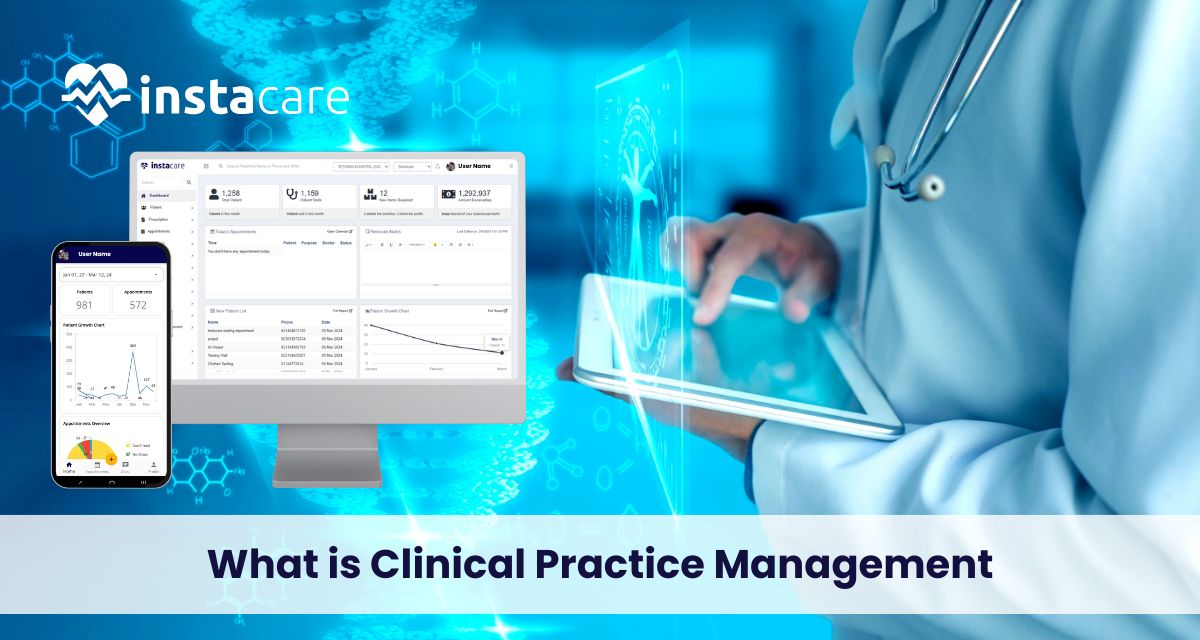Last updated on Monday, 26, August, 2024
Table of Contents
What is Clinical Practice Management?
Clinical practice management can be defined as structured coordination of multiple features in a healthcare practice for efficient service delivery. It deals with the integration of all administrative, financial, and operational procedures up to optimum standards in healthcare, improvement of workflow, and better performance of health facilities. This concept is of great importance both to small clinics and large institutions in health since it affects the quality of care delivered and the financial survival of a practice.
Elements of Clinical Practice Management
Clinical practice management has various elements that work together in perfect unison to help a clinical site. These include scheduling appointments, patient management, billing and coding, regulatory compliance, and management of the staff. The level of excellence in managing these five items ensures success for any clinical practice.
Scheduling Appointments and Patient Flow
The management of patient appointments is an important role in clinical practice management. Effective scheduling of time helps the facility to avoid delays experienced by patients, promotes effective deployment of clinical resources within the facility, and assures good utilization of health providers’ time. Effective patient flow management involves planning appointments, cancellations, and providing timely attention to patients.
Patient Management and Communication
Patient management can be defined as the clinical practice management concerned with the maintenance of accurate and up-to-date patient records, the assurance of continuity of care, and promotion of communication between all providers and patients. This includes being sure that information concerning a patient, treatment plans, and adequate information regarding a patient’s treatment and follow-up care are appropriately handled. Effective patient communication is essential in improving patient satisfaction and outcomes.
Billing and Coding in Clinical Practice Management
It is in any clinical practice management that billing and coding go directly to the financial health of the healthcare practice. Good coding ensures a provider’s services are well compensated, while good billing practices reduce the number of denied claims and potential lost revenue. Clinical practice management takes care of the whole cycle: from coding services provided like submission of claims to management of payment.
Compliance and Regulatory Requirements
One of the major parts of clinical practices management deals with the compliance of healthcare rules and standards. This means that a wide array of legislations, like the Health Insurance Portability and Accountability Act, needs to be met by properly maintaining the privacy and information security of patients. Clinical practice management has facilitated adherence to all legislations by avoiding lawsuit cases or fines against the practice.
Staff Management and Training
Effective management of staff in a clinical practice instills much-needed impetus to its operations. It includes organizing, training, and supervising clinical and administrative workers for their effective performance of duties. Training and development are very vital and must be constantly done to maintain high-quality patient care and to keep the employees informed and updated regarding new healthcare practices and technologies.
Financial Management of a Clinical Practice
Some of the essential parts include the clinical practice management of financial management, which includes budgeting, financial planning, and management of revenues. Proper financial management would ensure that high-quality care be delivered to patients with a profit-making aspect of the practice. This manages expenses, monitors cash flow, and makes well-informed decisions, hence ensuring optimum financial health for the practice.
Technology and Clinical Practice Management
Technology has played an important role in clinical practice management over the years. These tools are used to help keep the operations running efficiently, improve patient care, and create effective communication within the healthcare practice. This would include selecting the right technology for implementation, dependent upon the needs of the practice.
Quality Improvement and Patient Outcomes
QI is the continuous process of managing clinical practices for improved quality and health outcomes. It encompasses periodic evaluation of the quality of services extended, identification of opportunities for improvement in services offered, and the introduction of those changes that would bring about improved health outcomes for patients. Clinical practice management must be managed effectively with a focus on patient care, ensuring that every practice is aimed at achieving better health outcomes for patients.
Risk Management in Clinical Practice
Risk management in this aspect of clinical practice management incorporates the identification, assessment, and mitigation of possible risks that may have an impact on the practice. This includes risks towards patient safety, legal issues, financial stability, and staff performance. Effective risk management strategies protect the practice and the safety and wellbeing of both patients and staff.
Role of Leadership in Clinical Practice Management
Success in clinical practice management is dependent on the leadership. It is because good leadership supports the running of the practice, smooth, well-motivated, highly trained staff, and guarantees high-quality care for their patients. The leaders outline goals, strategies, and decisions enabling clinical practice management to execute successful execution. The effective leader encourages a good working atmosphere and continuous improvement culture.
Patient Satisfaction and Clinical Practice Management
Successful management of clinical practice is characterized by patient satisfaction. Satisfied patients are likely to return for future care and recommend the practice to others. Dimensions place in the model states that clinical practice management seeks to improve patient satisfaction through efficient operations, effective communications, and quality care. There is a need to maintain high levels of patient satisfaction through monitoring of patients’ feedback upon which changes are implemented.
Challenges to Clinical Practice Management
This is characterized by a good number of challenges that health care providers have to sail through. The challenges are complexities in billing and coding, compliance with regulatory requirements, and needs catering of a diversified patient base. On the other hand, it is tough to manage staff, maintain financial stability, and integrate new technologies. In essence, clinical practice management is successful if one is able to adapt, learn continuously, and solve problems proactively.
Future of Clinical Practice Management
Growth in technology, change in healthcare regulations, and shifting in patient expectation will most likely all play a big part in setting out the future for clinical practice management. Interest in innovation, staff development, and culture of patient-centered care are some of the good signs that a practice will do well in the future. This, therefore, implies that in a rapidly changing environment within healthcare practice management, it should be able to meet such challenges and seize opportunities that come with them towards ensuring sustained success of healthcare practice.
Conclusion
Clinical practice management incorporates ascertaining efficient management in every aspect of health practice towards efficient service delivery and high-quality care. Effective clinical practice management means everything from appointment scheduling and patient management to billing, compliance, and financial management, for it gives life to a healthcare facility. If continuous improvement is not the epitome of excellence, at least it’s the next best thing in a situation when perfection is next to impossible. With a focus on continuous improvement, use of technology where it makes sense, and good, if not great leadership, healthcare practices can successfully sail through these challenges.
FAQs
What role does technology play in clinical practice management?
Clinical practice management would be leading in the digitalization of operations, enhancing quality care delivery to patients, and a smooth workflow in communication. It would entail features such as EHR, PM tools, and telemedicine in running patient information, appointment scheduling, making bills, and keeping up compliance with regulations.
How will clinical practice management satisfy the patients?
Clinical practice management has a direct impact on the satisfaction of the patient because all dimensions of the practice are optimized for efficiency and quality. Some of the features of the satisfying experience include efficacious appointment scheduling, effective communication, and standards of care that are par excellence and at par with expectations. High levels of satisfaction will be derived from such excellent experiences.
What are the major challenges in the management of clinical practices?
The major challenges to clinical practice management mostly relate to complexities in billing and coding, health regulations, integration of newer technologies, and meeting the diversified needs of a large patient population. Integration and maintaining financial stability with proper management of staff are the continuous challenges that require a very proactive and adaptive approach.



